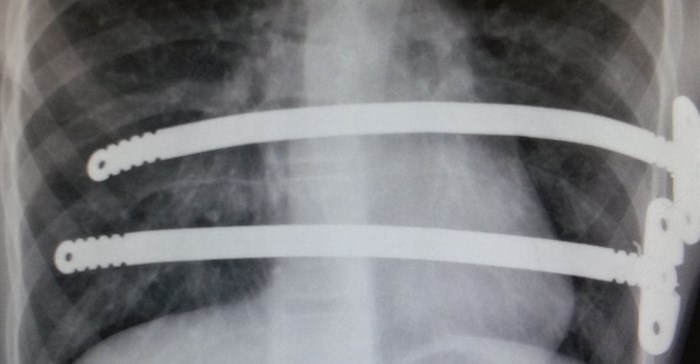
Cardiothoracic surgeon, Dr Ivan Schewitz, who was speaking at the recent 20th Congress of the Chest Wall International Group (CWIG), said that in South Africa, only the traditional open chest surgery used to treat this condition seems to be known. However, it can take patients many months to recover from this major operation, the Ravitch procedure, which also leaves considerable scarring on the chest.
“Many doctors are therefore reluctant to refer patients with even the most serious sunken chest deformity for treatment. Parents are often also unwilling for their children to go through such a major operation. This can be tragic as pectus, which usually starts to become evident in the early teens, can develop into much more than simply an aesthetic problem, and in serious cases can result in a range of debilitating symptoms,” said Schewitz.
Pectus excavatum may be mild, moderate or severe. Whether or not a repair procedure is appropriate will depend on each individual case. In more severe cases, however, the breastbone can go on to place such pressure on the heart and lungs that it severely limits the physical activities of these growing and developing teenagers. In addition, the sunken chest often results in the individual suffering psychologically, experiencing “devastating self-esteem and confidence problems”.
The Nuss procedure involves temporarily placing curved metal bars behind the sternum to lift it to a normal position. It has been used to correct the deformity in at least 100,000 patients around the world since it was first developed by South African-born Professor Donald Nuss, and we were greatly honoured that he travelled from the United States to attend the 2019 congress,” said Schewitz.
The intricate Nuss procedure usually takes approximately two hours to complete, and is internationally regarded as the gold standard in the treatment of appropriate patients with more serious sunken chest.
Interviewed during his visit to South Africa, Nuss said that: “While this treatment option has caught on around the world, the uptake in South Africa has unfortunately been slower, with Dr Schewitz being one of the few surgeons to offer the procedure. One of the challenges is that while this approach offers a real solution for identified patients with more severe pectus, it is tricky to master and I think for this reason many surgeons here have avoided training in it.
Asked how he had come to develop the procedure, Professor Nuss said that he noted that pectus, which occurs among all population groups, although more so in some than others, was devastating for many young people and he felt that there must be a better solution to treating the condition than by means of the more traumatic Ravitch approach.
“I fully agree with Dr Schewitz that those who develop more severe pectus should be treated by the best means available for the particular patient. The signs of the condition become increasingly evident from puberty and into the teenage years, with the chest wall steadily and alarmingly collapsing as the youngster grows.
“Individuals with developing pectus should be assessed as soon as possible and, if necessary, undergo a correction procedure so that the strain on their organs can be relieved and their quality of life and self-esteem can be restored. In other words, we want these young people to thrive rather than having to grow up with this potentially debilitating condition,” Nuss said..